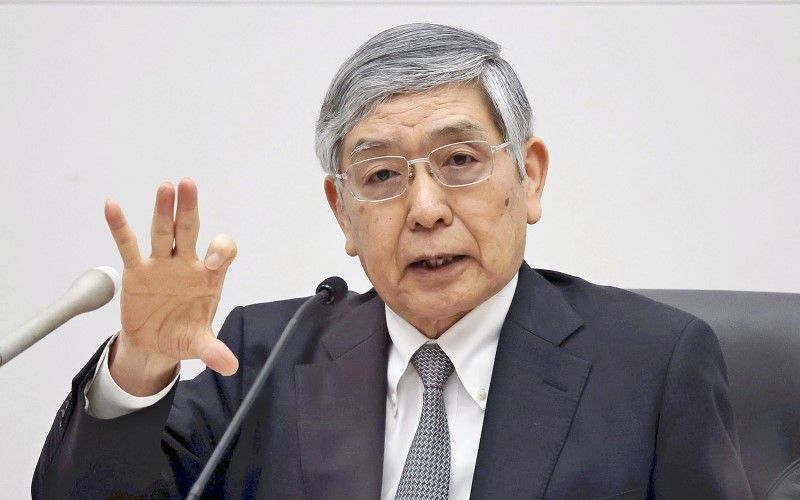
Bank of Japan Gov. Haruhiko Kuroda speaks at a press conference at the central bank in Tokyo on Tuesday.
17:52 JST, April 28, 2021
The Bank of Japan’s 2% inflation target seems unlikely to be realized anytime soon, even in the central bank’s view, according to its latest Outlook for Economic Activity and Prices released Tuesday.
In fiscal 2023, 10 years after the bank introduced its massive monetary easing policy, the BOJ’s Policy Board members’ median estimate for inflation is just 1%.
All signs are pointing to the central bank having to continue its ultra-easy money policy for the foreseeable future.
“It’s disappointing that it’s taking time to realize 2%,” BOJ Gov. Haruhiko Kuroda said at a press conference in Tokyo on Tuesday after the bank’s two-day Monetary Policy Meeting ended. He acknowledged that the BOJ cannot forecast when the inflation target can be reached.
Asked about not being able to achieve the target during his current term, which ends in April 2023, Kuroda said the central bank does not have to stick to meeting the target by that time.
“If the target can be achieved in fiscal 2024 or later,” he said, “then so be it.”
The BOJ has maintained its monetary easing policy since January 2013, when it raised the target for the consumer price index, excluding fresh food prices, to 2% year-on-year. The central bank initially said the target could be achieved in “about two years.”
In April 2013, soon after Kuroda become the governor, the central bank embarked on its quantitative and qualitative monetary easing program, engaging in activities such as purchasing massive amounts of Japanese government bonds.
In 2016, the bank also introduced a negative interest rate policy and its yield curve control to guide 10-year Japanese government bond yields as well as short-term interest rates.
Since the 2% target was introduced, however, prices have been slumping not only because of declines in crude oil prices. More recently, the economic slowdown caused by the novel coronavirus pandemic has been an additional factor.
Deflationary mindset
Kuroda has been trying to reach the target by focusing on raising public sentiment to expect inflation. The idea is that if more people think prices will rise in the future, consumer spending will increase and companies will also boost capital investment before prices go up. Kuroda’s scenario envisioned a virtuous economic cycle in which actual prices also rise.
Even though the BOJ bolstered the economy through monetary easing, most of the public did not expect prices to rise, partly because of the nation’s prolonged period of deflation.
“If the public actually experiences inflation, more and more people will gradually incorporate that into their mindset,” Kuroda said during the press conference. However, there is a long way to go until his scenario is realized.
Kuroda described the 2% target as “appropriate,” adding that he is not thinking of lowering it. Pointing out that the central banks in other major countries have also set similar 2% targets, the governor stressed that the BOJ will maintain its target.
“This has to do with the BOJ’s price stability mission,” he said.
However, some market observers are skeptical about the BOJ’s stance.
“As most people involved in the market believe that central banks now have few options available for additional easing, the BOJ’s commitment to the 2% target appears to be weakening,” said Kouichi Fujishiro, a senior economist at Dai-ichi Life Research Institute. “The central bank also appears to be shifting its focus to stably keeping prices in positive territory.”
Top Articles in Business
-

Prudential Life Insurance Plans to Fully Compensate for Damages Caused by Fraudulent Actions Without Waiting for Third-Party Committee Review
-

Narita Airport, Startup in Japan Demonstrate Machine to Compress Clothes for Tourists to Prevent People from Abandoning Suitcases
-

Japan, U.S. Name 3 Inaugural Investment Projects; Reached Agreement After Considerable Difficulty
-

JR Tokai, Shizuoka Pref. Agree on Water Resources for Maglev Train Construction
-

Toyota Motor Group Firm to Sell Clean Energy Greenhouses for Strawberries
JN ACCESS RANKING
-

Japan PM Takaichi’s Cabinet Resigns en Masse
-

Japan Institute to Use Domestic Commercial Optical Lattice Clock to Set Japan Standard Time
-

Israeli Ambassador to Japan Speaks about Japan’s Role in the Reconstruction of Gaza
-

Man Infected with Measles Reportedly Dined at Restaurant in Tokyo Station
-

Videos Plagiarized, Reposted with False Subtitles Claiming ‘Ryukyu Belongs to China’; Anti-China False Information Also Posted in Japan




















